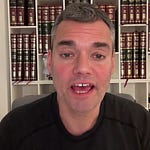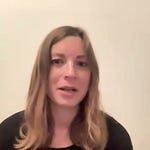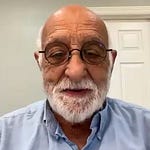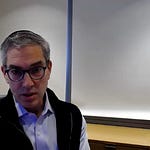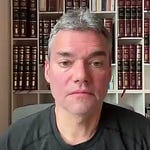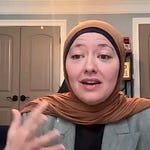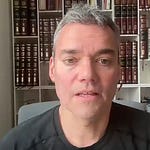Our call this week, for paid subscribers, will be at a special time: Thursday at 11 AM Eastern.
Our guest will be the award-winning author and journalist, Ta-Nehisi Coates. His new book, The Message, chronicles his trip to Palestine and Israel (alongside trips to Senegal and South Carolina) and meditates on why some people’s stories are told and others are erased. We’ll talk about how he came to write about Israel-Palestine, about how victims become victimizers, about the backlash he’s experienced since the book came out, and about the forces that keep Black writers from shaping public debate about America’s role in the world.
This conversation will be cosponsored with Jewish Currents and the Foundation for Middle East Peace.
Paid subscribers will get the link this Tuesday and the video the following week. They’ll also gain access to our library of past Zoom interviews with guests like Rashid Khalidi, Thomas Friedman, Ilhan Omar, Omar Barghouti, Benny Morris, Noam Chomsky, and Bret Stephens.
Premium Membership
We’ve added a new membership category, Premium Member, which is $179 per year (or higher, if you want to give more). In addition to our weekly Zoom interviews, Premium Members get access to a monthly live “ask me anything” zoom call and the video of that call the following week.
Our next “ask me anything” will be this Wednesday, October 9 at 11 AM Eastern.
If you’re interested in becoming a premium or regular member, hit the subscriber button below or email us with any questions.
My New Book
Knopf will publish my new book, Being Jewish After the Destruction of Gaza, on January 28 of next year. I hope the book will contribute, in some small way, to changing the conversation among Jews about what is being done in our name. But I’m keenly aware of two things: First, Jewish voices like mine usually get more attention in the US than do Palestinian ones. Second, while I’m publishing my book, Palestinians in Gaza— and beyond— are suffering in unspeakable ways.
So, while I hope you consider buying my book, I hope you also consider buying a book by a Palestinian author. As the weeks go by, I’ll offer different suggestions, but readers should feel free to email me their own. I’ve been deeply moved by Fida Jiryis’ Stranger in My Own Land, which charts her family’s painful and surreal journey, from Mandatory Palestine to Lebanon to Israel. It’s a book I wish I could make required reading in all the places, in America, Israel and beyond, where Palestinians are routinely dehumanized.
I also hope you’ll consider donating to a charity that works in Gaza. One good option is Medical Aid to Palestinians. If you have other suggestions, please send them.
Sources Cited in this Video
Noam Chomsky’s American Power and the New Mandarins.
Things to Read
(Maybe this should be obvious, but I link to articles and videos I find provocative and significant, not necessarily ones I entirely agree with.)
In Jewish Currents (subscribe!), Seth Anziska reflects on the lessons of past Israeli invasions of Lebanon for the one unfolding now.
Al Jazeera’s powerful new documentary, Starving Gaza.
Shane Burley details the purge of anti-Zionist staffers from American Jewish institutions since October 7.
An October 7 reading list.
Upcoming Talks
On October 29, I’ll be speaking at the University of Victoria.
See you on Thursday,
Peter
VIDEO TRANSCRIPT:
Hi. So, as it happens, the anniversary of October 7th falls in between Rosh Hashanah and Yom Kippur, in this period of time when Jews are expected to look inward and ask other people for forgiveness for the sins they’ve committed; and then, after doing that, then turn to G-d, and ask G-d for forgiveness for the sins that we’ve committed against G-d. And, famously in the al chet prayer, which appears ten times in the Yom Kippur liturgy, the confession of our sins is in the plural. So, for instance: for the sin which we have committed before you, openly or secretly; for the sin which we have committed before you, under duress or willingly. And I think there’s a tremendous power in the idea of a communal confession, that we are all responsible for each other’s misdeeds. But if you are a kind of critic of the American Jewish establishment and the Israeli government like me, there’s always also a danger, I think, that in the sense that you focus so much on the critiques of the community writ large, and its established leaders, and it’s easier to do that sometimes than to focus on one’s own misdeeds, one’s own sins.
And as I look back on this October 7th for the past year, I feel both a sense of a need to repent and ask for forgiveness in very, very different, and sometimes, I feel like, dichotomous ways. On the one hand, I feel a tremendous sense of guilt that I did not reach out more regularly, and with deeper concern and deeper urgency, to Israelis that I knew immediately after October 7th. I think that one of the things that this year has done is that it has created, I would say, a kind of a chasm between Israeli Jews and American Jews, or a kind of a greater degree of hierarchy than I think I’ve ever felt before. Because I think that the degree to which American Jews are just much safer than Israeli Jews, notwithstanding all of the stuff about how antisemitism makes American Jews unsafe—in reality, American Jews are far, far safer than Israeli Jews. And I’ve never felt that dichotomy as powerfully as I did after October 7th.
And I think there’s one Israeli friend, in particular, who I did not reach out to after October 7th because, honestly, I was too afraid of how angry they would be at me for my political position of opposing the war. And so, in a kind of a cowardly action, I didn’t reach out to them because I was afraid of the political conversation we would have. And that was a real, tremendous failure, and has really haunted me since then. And, at various points, I felt that I have simply not done enough to be in solidarity with Israeli Jews, in their period of terrible fear and agony, have been too caught up in things happening in the United States.
And I’ve also felt that I haven’t done enough for the hostages. I mean, obviously not that there’s that much I could do, but just I, you know, I decided not to wear a dog tag with their name on them because I felt like maybe I was afraid that people would think I was pro-war. Or maybe I was afraid people would think I was a poser because since I was against the war, you know, no one would believe me that I actually cared enough about the hostages that I was wanting to remind myself of them every day. But, you know, there were many, many events for the hostages. Some of them I did go, and I spoke at a few. But there were many, many more that I could have gone to that I didn’t because I was just going about my life, you know, and I wasn’t living daily with their sense of agony. And I know there were people here in New York who were—daily—living and reminding themselves daily of the agony of the hostages, bringing it to their attention every single day. And I feel a sense of shame that I didn’t do that more.
And yet, strangely, I also feel another kind of shame. You know, this first kind of shame maybe suggests that I don’t feel like I fully lived up to this famous injunction, you know, Talmudic injunction, kol yisrael arevim zeh bazeh, that all Jews are responsible for one another. And yet, that’s only one part of Judaism’s voice. Another part of the Judaism’s voice comes for me very powerfully in this notion, also in the Talmud, that G-d created Adam, who is not of any race or religion. Judaism does not believe that Adam and Eve were Jews. They were universal human beings before G-d creates a covenant with Abraham. And the Talmud says that one of the reasons that there was one singular person created by G-d was that so nobody could say that my father is greater than your father, which is to say that my lineage, my tribe, my race, whatever, is greater; that we are all descended from fundamentally the same people, and that it is a grave sin to create a hierarchy among human beings.
And yet I also feel that so much of the discourse over the last year has been saturated with a sense of the hierarchy of human lives, that Israeli Jewish lives, or, for that matter, American lives, or Western lives, really matter. And Palestinian lives just don’t matter as much, or Lebanese lives matter. Maybe they have some value, but just they’re not as important, right. And so, that when Palestinians die, they don’t get the same individualized attention. We don’t know their names in the way that we might know the names of Israelis who have died as hostages. Their parents don’t speak at the Democratic Convention. Again, I say this not to say that I was not very happy and moved by what Hersh Goldberg-Polin’s parents did. That was wonderful, but always the very sharp disjunction between who is humanized and who is not, who gets spoken up as a kind of faceless mass.
And I feel that I was very complicit in that in various ways. I still, first of all, feel that just as I didn’t go to enough events for the hostages, I also didn’t go to enough anti-war rallies. I was never arrested. I know tons of people who were arrested, who had a lot more to lose than me. And yet, I was just, you know, going about my life, and didn’t want to have that burden. But beyond that, I felt often times that even as I was making anti-war arguments about why I thought Israel’s military actions wouldn’t work well, wouldn’t succeed, or why I thought certain points were wrong, that being engaged in the conversation itself—the very premises of the conversation that I was engaging in themselves—were premised on the idea that a certain number of Palestinian lives were okay to take, just not beyond this number. Or a certain amount of Palestinian denial of freedom was okay, just not beyond this number. Or if Israel really would succeed in this military effort, then it would be okay to kill and maim and injure a certain number of people. But it’s only wrong if they don’t succeed.
All of these things, to me, I feel a certain kind of shame for being engaged in those arguments themselves that were premised on Palestinians as lesser human beings. And it really struck me as I was reading over the recent Jewish holiday, Rosh Hashanah and Shabbat, the series of essays by Noam Chomsky that he wrote during Vietnam. And I want to just quote from something because I think he captures this idea very well. He talks about in his anti-war speeches and essays, he writes, ‘increasingly, I have had a certain feeling of falseness in these lectures and discussions. This feeling does not have to do with the intellectual issues, but the entire performance is emotionally and morally false in a disturbing way.’ And then he goes on: ‘by entering into the arena of argument and counterargument, of technical feasibility and tactics, of footnotes and citations. By accepting the presumption of legitimacy, of debate on certain issues, one has already lost one’s humanity.’
And that is, in many ways, a year after this the way I feel. That so much of the debating points that I have been going back and forth on so many times has already been premised on the idea that there are things that justify the denial of Palestinian freedom; that there are things that justify the killing and wounding and maiming and starving of Palestinian children. And that’s simply wrong. Just as I do not believe that anything would justify the denial of freedom to Israeli Jews, nothing justifies the denial of the killing of an Israeli civilian, let alone, G-d forbid, an Israeli child. Nothing justifies the killing of a Palestinian civilian, of an innocent Palestinian, or injuring them, or denying them food, or denying them their basic humanity, their freedom, which is a gift from G-d. It’s not a gift from the Israeli state or from Joe Biden. It’s their right because they are human beings. And that’s true for the people in Lebanon as well.
And I feel like it’s so hard sometimes to remember that when one is engaged in mainstream American political conversation because so often the very assumptions are built in the notion of a lesser humanity. And so, I feel like that’s something that I need to atone for and repent for. And when I saw Chomsky, who I consider such a great man, and who I have had the great, great honor to pray for every morning in a mi sheberach for his health, which is a great kind of honor that he bestowed on me, to allow me to do that, those words have really been ringing in my ear in this moment of repentance and atonement; that there’s something wrong about ever engaging in a conversation which is premised on the idea that certain human beings are lesser than other human beings. And I hope somehow—I don’t know how, but somehow—that in this year to come, that we will move to a world in which that is no longer the norm of the way we think and talk in the United States, and in the West, and in the Jewish community. Because I think, fundamentally, it’s an affront—in my view—it’s an affront to G-d and to our tradition.


